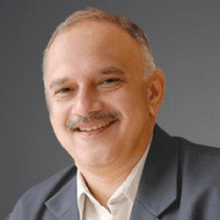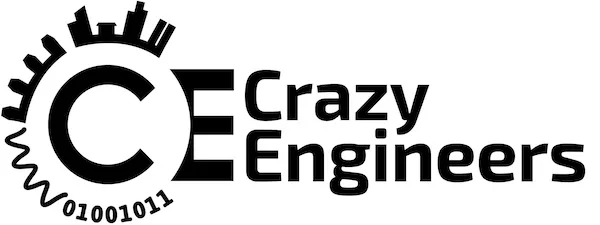Dr. Anand Deshpande - Persistent with Persistent

Engineers are eternal. Engineers are persistent. Engineers are at the core of entrepreneurship. Leaving safe & secure job to do pioneering work in Outsourced Product Development in India, back in 1990 was not an easy job. He came, he saw, he fought & he conquered. Yes, he is Dr. Anand Deshpande!
CrazyEngineers is extremely proud to have Dr. Anand Deshpande (co-founder & MD) of Persistent Systems Limited (India), a leader in Outsourced Product Development. In the following Small Talk, Dr. Deshpande answered questions asked by engineers from all over the world and shared his experiences in setting up Persistent Systems in Pune, India.
Check out our exclusive Small Talk with Dr. Anand Deshpande...
CE: Sir, from IIT- Kharagpur to Persistent – how is the journey so far?
Dr. Deshpande: The journey has been very exciting. In the early days of Persistent life was tough. In 1990 when we started, there was political uncertainty and the Indian economy was going through rather difficult times.
While we were promised that we would get space in the STP as soon as were incorporated as an entity, nothing really moved for first 6 to 9 months. None of the companies who were allotted space in the STP started operations and no additional space was acquired. While Persistent had orders to execute, we had to wait till March 1991 to get space. Additionally, we had to spend significant time getting all the paper work to get started. We also prepared a proposal for the bank and applied for a bank loan. In mid 1991, all bank loan applications were placed on hold and it took us nearly six months to get the loan sanctioned.
That was not all. It was very difficult to do outsource software development at that time. Communication was very difficult and expensive. Every morning, we would connect to CompuServe to download mails and at the end of the day, we would send mails by uploading it on CompuServe. We had to keep a record of the number of bytes transferred. Speeds were very slow. We would get speeds of 2,400 bps to 9,600 bps. Effectively, we would chunk messages in 30 K byte chunks and it took about 5 - 6 minutes to upload each such 30 K byte file.
Today, I should say we have come a long way. We enjoy a presence in three continents across the globe with nine development centers in Europe, America and Asia with a state of the art infrastructure and a team strength of over 3700 employees.
Software development is all about team-work. The combination of talent, team-work, passion and hard-work has helped Persistent get to where we are today. A lot of hard-work, sweat and sacrifices of employees and their families have gone into the making of the company. We have a very talented team that is passionate about product development.
Persistent has been in the software engineering outsourced product development space since its nascent stage and has witnessed the outsourced product development industry evolve into one of the fastest growing Industries in the IT space.
CE: Sir, you could have continued your job at HP in USA. What motivated you to give up your safe & secure job to start Persistent?
Dr. Deshpande: I was very clear about coming back to India after completing my Ph. D. in Computer Science in the US. While I worked in at HP Labs for 18 months, I did not stay long-enough to feel “settled.” My return was driven by my desire to live in India rather than to leave the US.
CE: Why did you name your company - “Persistent”?
Dr. Deshpande: Actually, ’persistent systems’ is a technical term used for systems that are persistent on the computer’s disk. Databases are typically ‘persistent systems’ and that was our early focus. No doubt, it has a more colloquial meaning and we like to “live” it.
CE: Persistent pioneered Outsourced Product Development in India. How is Outsourced Product Development different from IT services offering?
Dr. Deshpande: Product development is very different from IT Services outsourcing. Typically, IT projects start with well-defined requirements. Given these fixed requirements, vendors use time and money as variables to arrive at a reasonable cost estimate for the project. After completion, the project goes into a maintenance mode.
In product development, requirements are less clearly defined. Instead, most product developers are given ship-dates for the product that are typically determined by external factors. Once the ship-dates are identified, the budgets for the product are frozen. So, unlike a typical IT project where requirements are fixed and time and money are variables, a product development project starts with fixed time and money, thus leaving requirements as the only variable. So essentially, the product development team’s task is to produce the best set of requirements within a fixed time and budget.
Thus, in product development projects, all requirements can never be completely fulfilled in a particular version. As a result, most product companies plan multiple product versions for their product. While product teams must focus on developing the best product for the current release, every team member on the product development team must have an overall vision of the product direction. Every team member must contribute not only to building the features for the current release but must also contribute enhancements and provide feedback for future releases of the product.
CE: Sir, these days, we hear many people say that Indian IT is entering into its downward spiral. Do you think there is an iota of truth in it?
Dr. Deshpande: There is no truth to this. Overall, new technologies and new business paradigms are going to create exciting opportunities for Indian engineers to participate. Encouraged by the success over the last few years, most engineers entering the industry are very confident and are rearing to exploit these new opportunities.
I believe that there are some very important changes that are happening in India that will cause a tipping point – the trigger point for a revolution. One of these is the availability and the confidence of individuals capable of harnessing technology in India. While I am confident that the technology platform will get developed, I am far more excited by the attitude of young people in India. We have a large population of tech-savvy youngsters and engineers who are ready to build on the technology platform. They will build applications and new business models that will fuel growth
CE: Could you please tell us more about Persistent’s involvement with IUCAA?
Dr. Deshpande: As a part of these initiatives and contribution Persistent has also collaborated with NCRA in the AIPS++ project in the early 90s and has been working closely with IUCAA (Inter University Centre for Astronomy and Astrophysics) as a partner in the Virtual Observatory-India project (https://vo.iucaa.ernet.in/~voi). Jointly, we have established the Virtual Observatory India and are part of an international program that has allowed observatories to exchange data. This is of immense value to Indian astronomers who can observe from telescopes all across the world. Through this collaboration, Persistent has developed domain expertise in technology areas related to astronomy and with over the last five years of collaboration has built an understanding of working closely with astronomers.
CE: How do you manage to get free time to play games on your Nintendo Wii?
Dr. Deshpande: My kids play the Wii. I sometimes play with them in the evenings or may be on weekends.
CE: Your idol:
Dr: Deshpande: At different stages in life, I had different people who inspired me and were mentors or role models. In my childhood it was my mother, when I joined IIT, one of my professor’s of computer architecture had a great influence on me and my thinking. Later when I started working it was my father from whom I was inspired and learn a lot.. so there have been different people at different stages from whom I have learnt or have inspired me.
CE: Punch line for yourself:
Dr. Deshpande: Be “PERSISTENT.”
CE: Average number of emails you handle everyday:
Dr. Deshpande: About 300 messages a day.
CE: If not an entrepreneur, you would have been:
Dr. Deshpande: Professor
CE: Persistent, in next five years, will:
Dr. Deshpande: Continue to be persistent.
CE: Firefox or Internet Explorer:
Dr. Deshpande: I use Internet Explorer at Work and Firefox at home.
CE: We thank you for taking out time to talk to us. What is your message to the CEans (aka Crazy Engineers)?
Dr. Deshpande: I am excited about the opportunities for the Indian IT community. We are very well poised. The world is gearing up for new technology shifts and we have a great opportunity to be an integral part of this.
Unfortunately, I find that some of us are too concerned about short-term gains – lots of hopping around with no desire to build depth and completely driven by immediate financial rewards. In our industry where the technology shifts fast, it is very important to stay abreast and build deep defensible skills. Anything else will be disastrous very soon.
________________________________________
CrazyEngineers is thankful to Pinal Patil for her efforts in making this Small Talk possible. For more information about Persistent Systems, please visit www.persistentsys.com.
